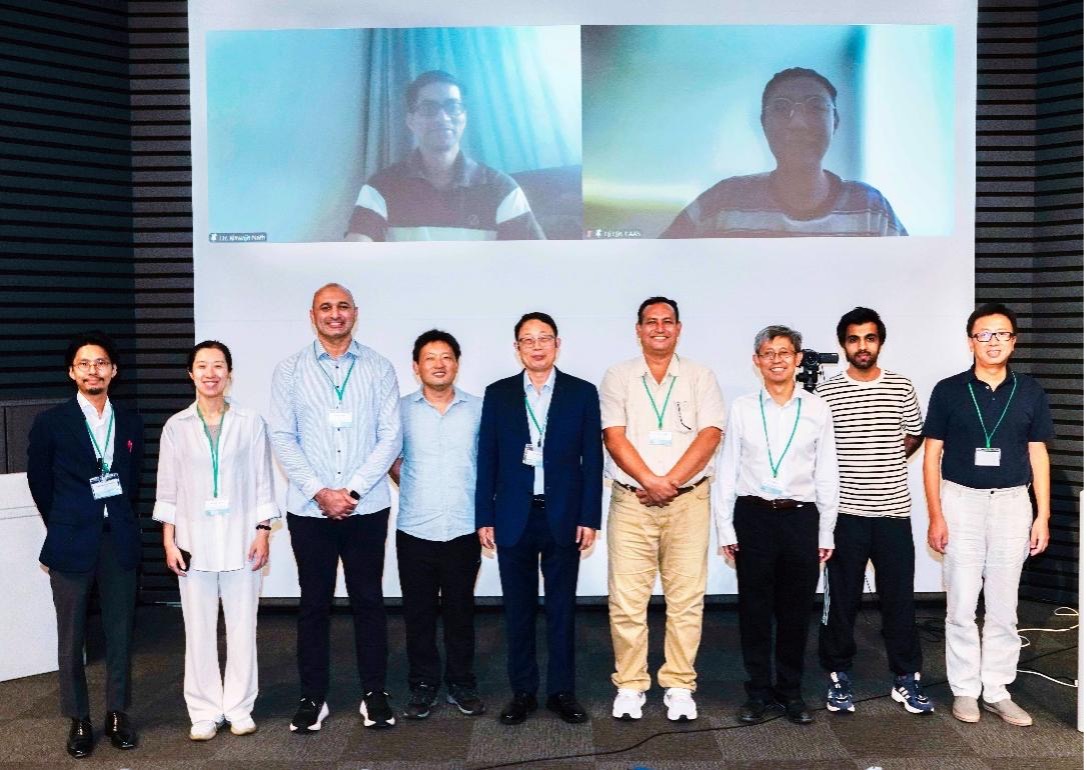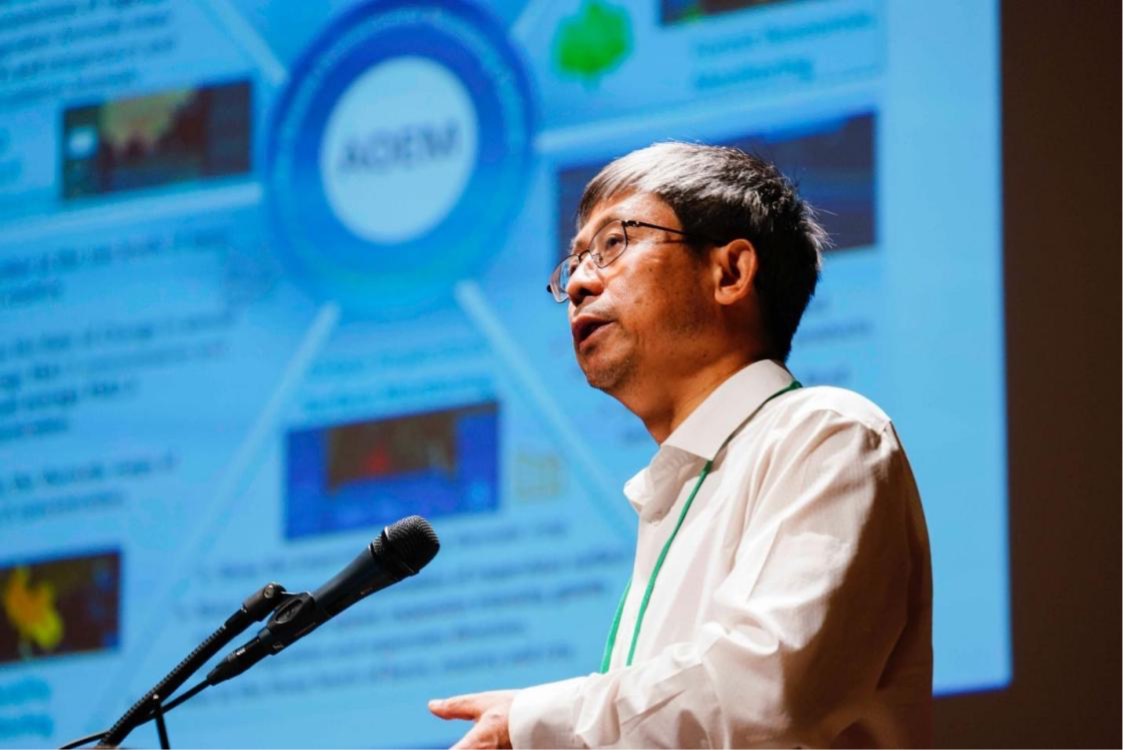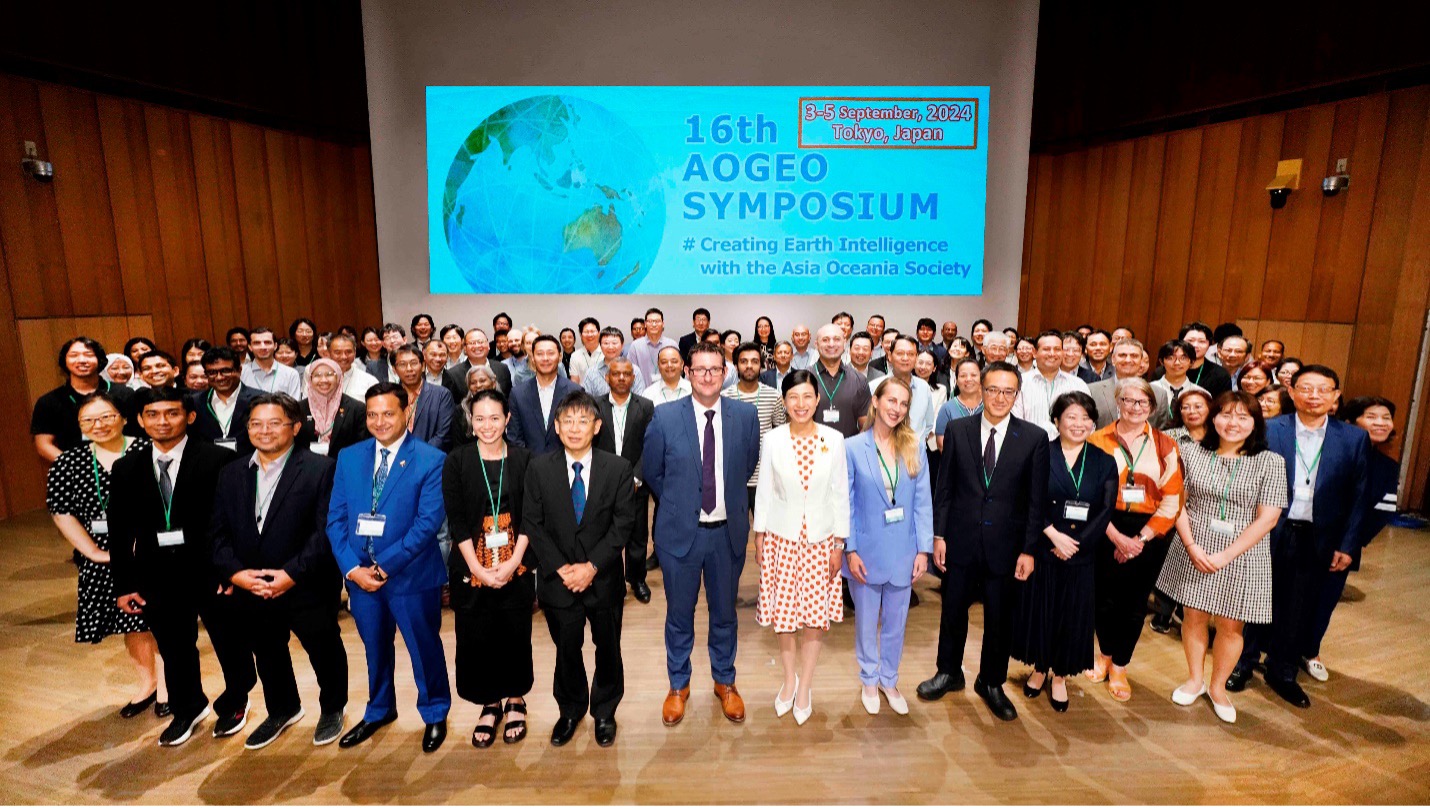AOGEO Symposium 2024 Concludes in Tokyo: Advancing Earth Intelligence and Regional Cooperation
From September 3 to 5, 2024, the 16th AOGEO Symposium was held in Tokyo, Japan, focusing on Earth Intelligence within the Asia-Oceania region, its application, and promoting global equity. The symposium aimed to contribute to the Post-2025 GEO Implementation Plan. The event was attended by over 100 global experts, including notable figures such as Ms. Akiko Honda (Parliamentary Vice-Minister of Education, Culture, Sports, Science and Technology of Japan); Prof. Dr. Gu Xingfa (Initiator and Co-Chair of AOGEO and member of the GEO Program Board); Ms. Yana Gevorgyan (Director of the GEO Secretariat); Mr. Andrew Murdock (Post-2025 SIP Lead at the GEO Secretariat); Prof. Megan Lewis (AOGEO Coordination Board Co-Chair); and Dr. Sara Venturini (Chief of Member Services at the GEO Secretariat).
During the opening ceremony, representatives from Australia, Indonesia, Japan, South Korea, Maldives, Mongolia, Nepal, Thailand, Vietnam, Cambodia, and China presented their respective country reports. On the second day, Special Sessions were organized by each of the seven AOGEO task groups. The symposium concluded with task group summaries and a closing ceremony.
Prof. Liu Qinhuo from the Aerospace Information Research Insititute (AIR) under the Chinese Academy of Sciences, also a Co-lead of AOGEO-TG7 and Co-lead of the GEO Pilot initiative GEOARC, provided a comprehensive overview of Task Group 7 (TG7). His presentation covered an overview of TG7, achievements, ongoing issues, and future directions post-2025. Under Prof. Liu’s leadership, TG7 has developed advanced algorithms and products utilizing China’s domestic satellite data. This work led to detailed national reports for China, Cambodia, Laos, and Thailand and the establishment of the Asia-Oceania Environmental Monitoring Platform (AOEM) to monitor ecological and environmental changes. TG7's efforts have significantly impacted research on air quality, climate change, and other regional issues, demonstrating a strong commitment to global environmental understanding and action. Prof. Liu also emphasized the role of the Environmental Monitoring Platform (EMP) in advancing technologies to enhance the quality of Earth Environment Variables (EEV) products and to improve regional decision-making capabilities, thereby supporting climate change response, biodiversity conservation, and environmental quality governance.
Prof. Zhong Bo from AIR introduced "the first 16-m global land cover map from the Chinese GaoFen ARD," the first land use/ land cover (LULC) product generated from Chinese satellite data using the MuSyQ system. He noted that ARD improves land cover mapping accuracy and temporal consistency, revealing subtle annual variations. He recommended using public platforms to validate ambiguous land cover types.
Dr. Faisal Mumtaz from AIR, presented a recent project entitled "Integrated Remote Sensing Monitoring of Ecosystem over Asia-Oceania Hotspots," emphasizing the AOEM platform. Dr. This platform aims to provide rapid insights and support ecological protection, developing 16 thematic products and several country reports using domestic satellite data. AOEM seeks to enhance regional AOGEO international cooperation, providing crucial information services and decision support for effective environmental and ecological management.
Aligned with the key objectives of TG7, Prof. Sawaid Abbas from the Center for Geographical Information System, University of Punjab, Lahore, Pakistan, discussed "Pakistan's perspective on national environmental policies." He addressed challenges such as institutional hurdles, resource constraints, and enforcement issues impacting policy implementation in Pakistan. Prof. Abbas highlighted the need for improved coordination among federal and provincial bodies, increased financial and technical resources, and stronger enforcement mechanisms. He proposed a COP model tailored to Pakistan, based on the UNFCCC framework, to enhance local-level action and accountability. Prof. Kasturi Devi Kanniah from Universiti Teknologi Malaysia, discussed the potential of remote sensing technology for air quality monitoring in Malaysia. Dr. Akkarapon Chaiyana from the Asian Disaster Preparedness Center (ADPC), Thailand, presented the spatial and temporal patterns of mangrove forest change in Thailand over four decades using a remote sensing data-driven approach. Mr. Norint Net from the Ministry of Environment, Cambodia, updated on Cambodia's National Forest Monitoring System. Prof. Md. Nurul Islam from the Department of Geography and Environment, Jahangirnagar University, Bangladesh, discussed the environmental monitoring of Dhaka City, while Prof. XIN Xiaoping from the Chinese Academy of Agricultural Sciences shared insights on global environmental changes in major deserts and surrounding areas.
During the coordination board and TG lead's statement meeting, Prof. Liu Qinhuo emphasized standardizing and validating remote sensing products through national reports and comprehensive platforms. He stressed the need for enhanced cooperation among AOGEO members and securing resources and funding for future advancements. Looking beyond 2025, he highlighted the necessity of increased stakeholder engagement and regional coordination, proposing the development of a comprehensive GEO Implementation Plan that prioritizes actionable Environmental Intelligence, supporting decision-making, and strengthening global collaboration.
On the sidelines of the meeting, Dr. Faisal Mumtaz had a detailed discussion with Dr. Sara Venturini, Chief of Member Services at the GEO Secretariat. Dr. Venturini shared her insights into TG7's efforts and achievements, explored opportunities for enhancing global efforts with GEO support, and discussed how GEO could contribute to TG7’s work for improved environmental protection and Earth Intelligence. Dr. Venturini endorsed the contributions and efforts of TG7 and emphasized the need for continued discussions on the group's important work.
The Symposium concluded on September 5 with the formal adoption of the 2024 AOGEO Statement by Ms. Mariko Harada, AOGEO Coordination Board Co-Chair from the Japan Aerospace Exploration Agency (JAXA), presented the statement in the presence of Prof. Liu Qinhuo.

Task Group 7 "Environmental Monitoring and Protection" members.

Liu Qinhuo delivers a progress report on Task Group 7.

The 16th AOGEO Symposium photo.



News & Events